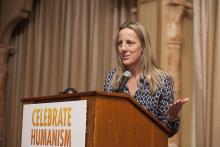What Is It
Humanism as a movement arose with the Renaissance. It took powerful expression with the Enlightenment, and deeply influenced the founding of the United States. But now "secular humanism" is widely decried and even derided. What was Humanism, and what has it become? In an age of appreciating the interconnectedness of all nature, is the Humanist enterprise out of date? Ken and John are joined by Jennifer Bardi, editor of The Humanist magazine, for a program recorded live at the 69th annual conference of the American Humanist Association in San Jose.
Listening Notes
Ken begins with the question: What could be controversial about humanism? Humanism began in the Renaissance with a renewed appreciation for classical art, rejecting the Medieval focus on the afterlife, which ultimately led to the Renaissance and the modern world as we know it. But, as John reminds us, that account avoids the controversy altogether. One can certainly object to current humanist philosophies without objecting to its historical importance. Ken agrees, admitting that ‘humanism’ must be distinguished from ‘secular humanism,’ a modern movement that urges its adherents to focus on this life as the only life.
What does it really mean to be a humanist? Jennifer joins the conversation to help answer our questions. Does a humanist have to be an atheist? Perhaps not, but Jennifer admits that talk of spirituality does not fill the humanist convention. Jennifer calls humanists ‘godless do-gooders, while atheists are merely godless.’
If humanists believe the world to be a rational, godless place, then doesn’t it follow that we are merely one species among many? So, then, why human-ism? Are humanists species-ists? Without God, how do we justify the unique treatment of the human species? Jennifer believes that the name ‘humanism’ may be misleading, that humanists do not necessarily feel that humans are inherently more deserving than other species.
Do some view humanism as a substitute for religion? Can humanism hope to replace religion? One problem that an audience member brings up is that God provides meaning, but how do humanists hope to provide genuine meaning to life without invoking God or a higher power? John, Ken, and Jennifer band together to insist that meaning can be found in a Godless world, even offering individual suggestions as to how to find that meaning.
- Roving Philosophical Report (seek to 6:15): Rina Palta travels to a humanist conference to find out exactly what being a humanist is all about. And she found more than just ‘Blasphemy Jeopardy,’ she found Bill Nye the Science Guy, who won the most recent humanist of the year award.
- 60-Second Philosopher (seek to 50:15): According to Ian Shoales, humanism replaces centuries of eclectic religious traditions with…evolution? What’s the attraction? Humanism seems boring. There’s not even a secret handshake!



